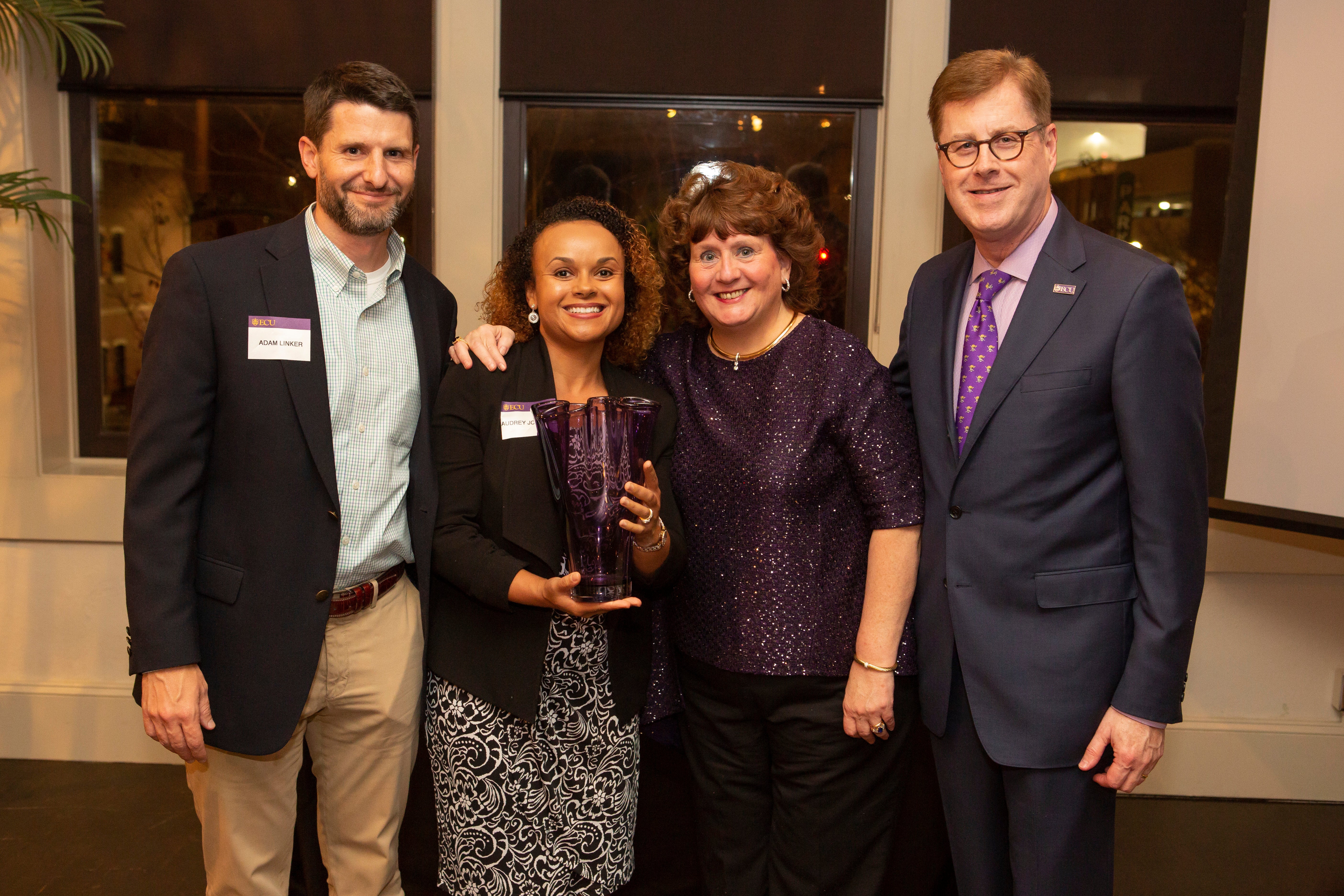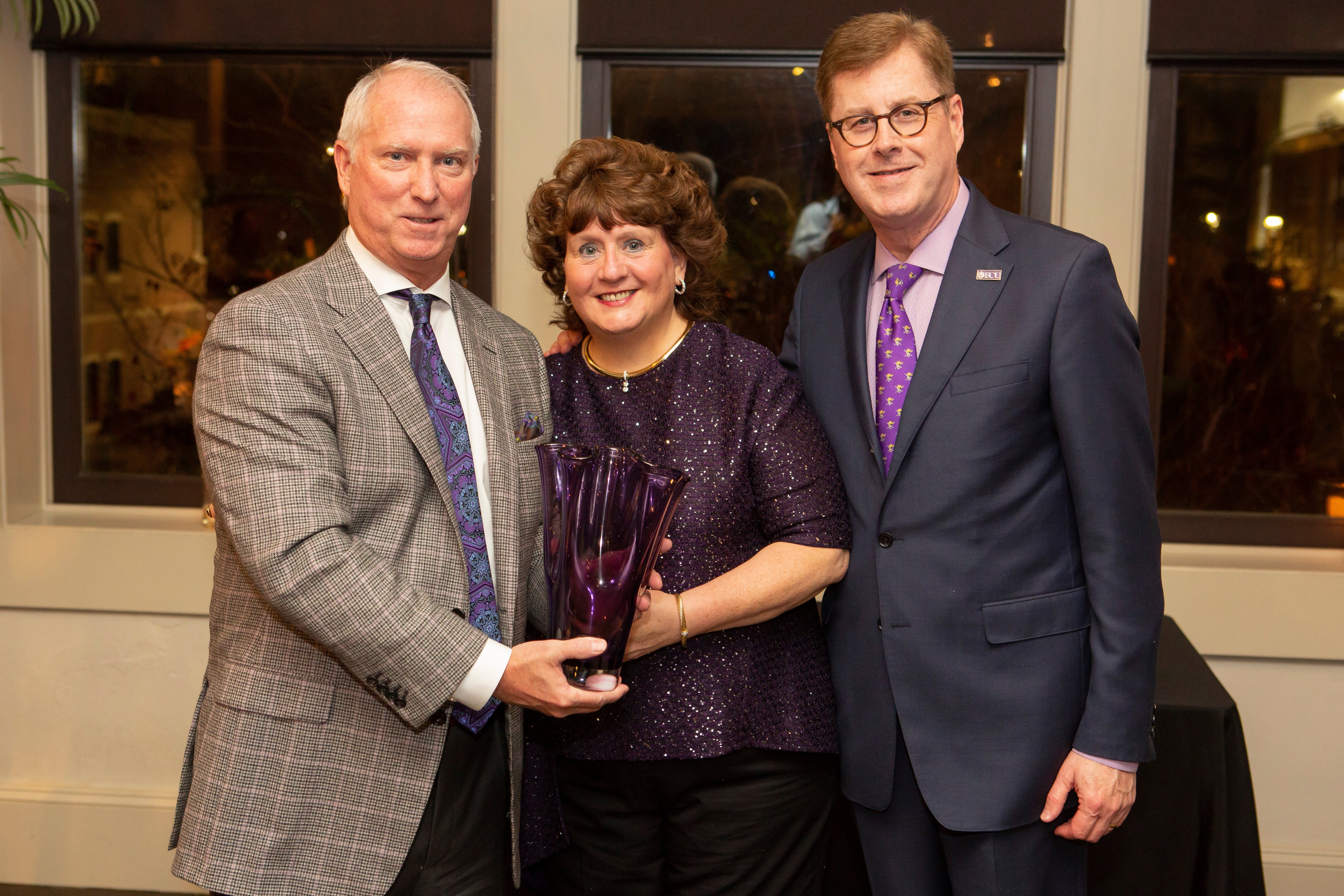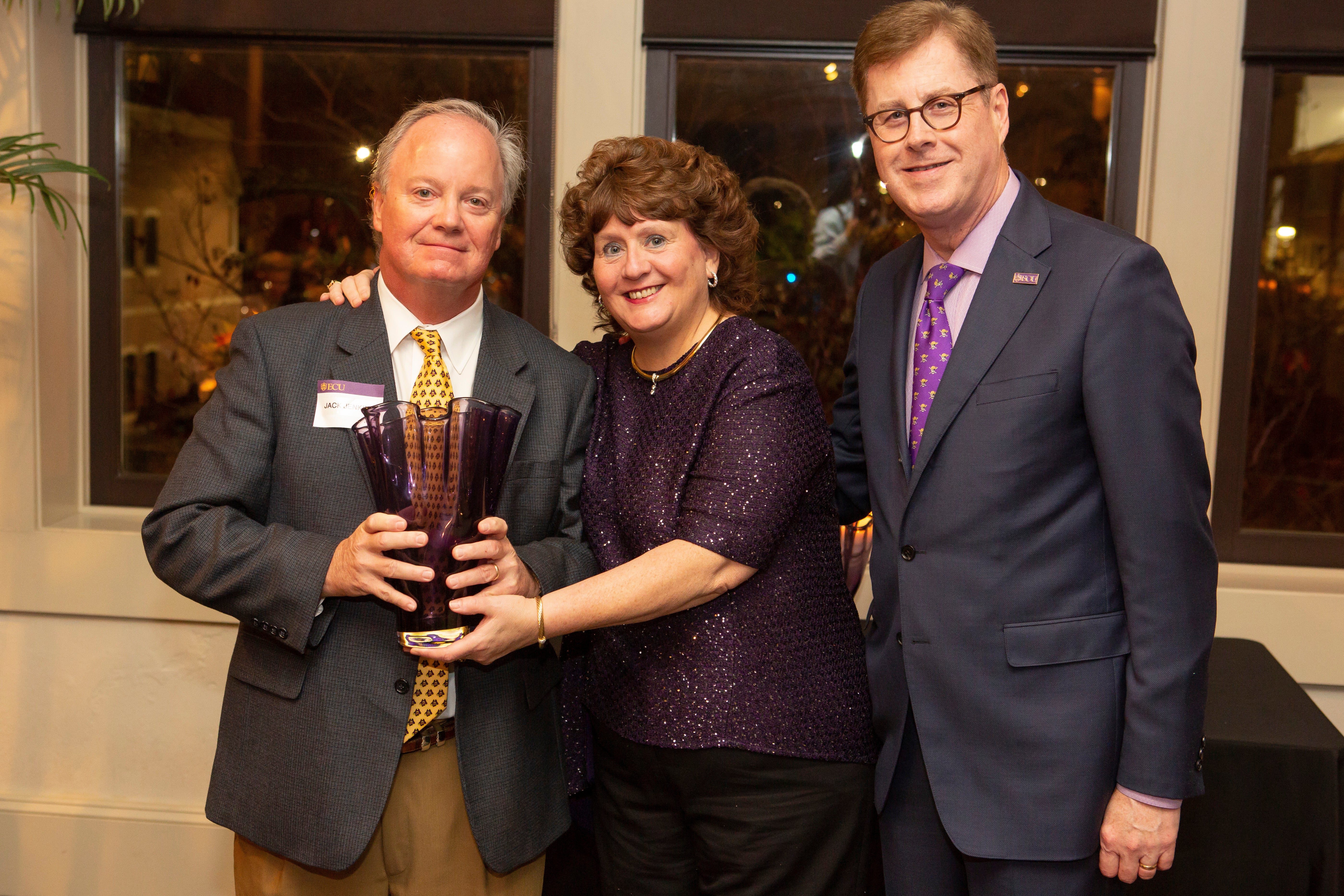CHANCELLOR’S AMETHYST
Staton honors ECU philanthropy at award ceremony
At East Carolina University, there are several names on campus that are instantly recognizable. Jenkins and Minges are among them. Students and faculty know the Jenkins Fine Arts Building and Minges Coliseum, but perhaps not the stories behind them, stories of individuals who left indelible marks on the university and serve as testaments to human contribution.

Adam Linker and Audrey Johnson accept the Chancellor’s Amethyst on behalf of the Kate B. Reynolds Charitable Trust. (Photo by Will Preslar)
Chancellor Cecil Staton honored the contributions of the Minges and Jenkins families as well as the Kate B. Reynolds Charitable Trust at the fall Chancellor’s Amethyst ceremony on Thursday, Nov. 1. The Chancellor’s Amethyst is a special recognition of philanthropic commitment and generosity to ECU that is awarded each fall and spring. The tradition began in 2016 and is awarded to individuals, couples, foundations and corporate partners who generously support the university.
“Our donors are partners in creating an extraordinary ECU. They allow us to sustain innovation, excellence and competitiveness for the long term,” Staton said. “We’re here tonight to sincerely thank some of our university’s most impactful givers.”
The first awardee, the Kate B. Reynolds Charitable Trust, is an organization whose mission is to improve the quality of life and health for North Carolinians in need. The trust is named for the late Kate Gertrude Bitting Reynolds, a leader in establishing and maintaining community hospitals in Forsyth County and an activist for better wages and working conditions for factory workers.
Since it began in 1947, the trust has invested more than $500 million dollars toward improving life and health for North Carolina residents. The trust has awarded more than $7 million in grants to ECU in particular.
“The trust has partnered with ECU for much of its 70-year existence. We share a mission and a passion to help improve the quality of life for people throughout North Carolina but specifically for people in the eastern part of the state,” said trust president Laura Gerald. “We see people’s lives change as a result of the investments we’re making. Nothing could be more rewarding.”
With funding from the Kate B. Reynolds Charitable Trust, the School of Nursing developed a case management program for school children with chronic illness, the Department of Physical Therapy was able to purchase specialized diagnostic equipment for a state-of-the-art gait and balance laboratory, and the Division of Infectious Diseases in the Brody School of Medicine was able to increase services and access to individuals with HIV/AIDS in eastern North Carolina.
“It’s always wonderful working with a group that shares our values and our desire to help underserved communities in our state. The Kate B. Reynolds Foundation is a great partner for ECU and well-deserving of our gratitude and the Chancellor’s Amethyst,” Staton said.

Jeff Minges accepts the Chancellor’s Amethyst on behalf of the Minges family. (Photo by Will Preslar)
The next Amethyst went to the Minges family, which has a legacy of giving to ECU that goes back decades.
Miles Otho Minges and his brother Luther Lester Minges owned the Orange Crush Bottling Company in Greenville with a 13-county franchise for Pepsi-Cola.
The earliest story linking the Minges family to ECU is from the 1940s, when M.O. Minges and other community leaders were called together to raise funds for the college when a steam boiler needed repair. By the early 1950s, M.O.’s sons and daughter all became active in the family Pepsi business and supporters of ECU.
Dr. Ray Minges was a guiding force in promoting the development and growth of the entire athletic program at ECU. One of his biggest contributions was developing the East Carolina University Century Club (now the Pirate Club) in the 1960s. He was a charter lifetime member of the Pirate Club and remained active in the organization until his death in 1987.
His daughter, Ginger Minges, said he loved ECU and Greenville and wanted to see them both grow.
“I really appreciate the university for remembering, acknowledging and honoring us. It means a lot to me that we’re still part of the ECU family,” she said.
“We will try to live up to the legacy of our forefathers, whose leadership is marked by a dedication of time, energy and generosity to myriad worthwhile causes. The challenge for me is living up to that legacy.”
Ray Minges’ brother Jack gave $25,000 to the school for the construction of a basketball facility.
The donation was the largest ever gift to the university at that time. In 1968, the university named the basketball arena Minges Coliseum to honor the family’s ongoing support.
“The Minges family keenly understands that Greenville’s future is unmistakably tied to the overall success of the university, and its members remain loyal, faithful friends and supporters of ECU,” Staton said.
The final award of the night went to the Jenkins family, with a special recognition for Leo Jenkins.

Jack Jenkins accepts the Chancellor’s Amethyst on behalf of the Jenkins family. (Photo by Will Preslar)
Leo Jenkins arrived at ECU (then called the East Carolina Teachers College) in 1947 as a dean and eventually became the university’s sixth president.
During his tenure, Jenkins pushed for campus expansion, stronger academic programs and increased enrichment opportunities. He helped establish the School of Nursing, the School of Arts and Sciences and the School of Education. He campaigned for ECU to receive university status and NCAA recognition, and succeeded in 1967 and 1961, respectively.
He then led the creation of a four-year medical school at ECU, recognizing the eastern part of the state desperately needed doctors to serve the citizens of the region.
“The overall magnitude of what Jenkins accomplished is remarkable. He is without a doubt one of the most prominent leaders this campus, community and state have ever seen,” Staton said. “Leo Jenkins honored ECU with his ambitions and his success, and now we honor him with the Chancellor’s Amethyst.”
Jenkins passed away in 1989. His youngest son Jack described him as a family man and “maximum citizen” who was involved in many clubs and organizations in addition to his university work.
“This award is for my father. He is the one who earned it. He would be thrilled to know that after all these years, he is still remembered and still respected,” Jack Jenkins said. “My father said his greatest accomplishment was instilling a sense of pride in the people of eastern North Carolina. He said the people of eastern North Carolina walked a little taller because of ECU.”
The Jenkins family, the Minges family and the Kate B. Reynolds Charitable Trust join several illustrious individuals and organizations honored with the Amethyst vase since 2016. They are: Bill Clark, Max Ray Joyner Sr., The Oak Foundation, The Harold H. Bate Foundation, Dan and Elizabeth Nichols, Harriet Wooten, The Golden LEAF Foundation, Walter and Marie Williams, BB&T, Carl and Connie Rogers, and Drs. Mary Raab and William McConnell.
